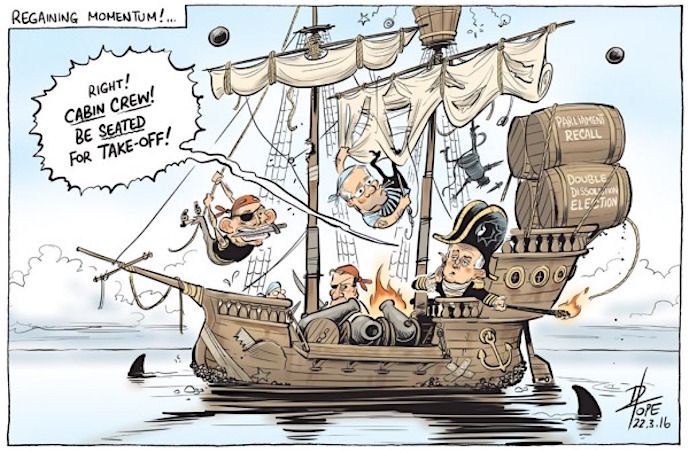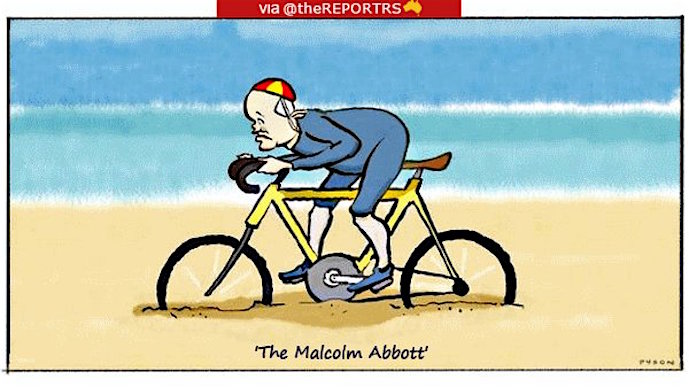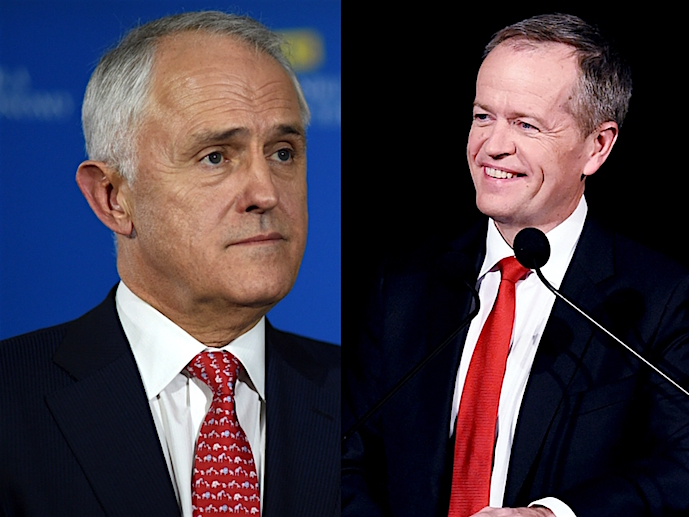-
10/07/2016
-
Ad astra
-
Independents

The MSM and blog sites abound with critiques of the election and tentative predictions of the political outcomes. So why bother writing yet another to explain how it has all come to this? You will judge whether this analysis adds anything useful.
Far from fulfilling his oft repeated promise of stable government and sound economic management; far from avoiding the 'chaos' of a close result, Turnbull seems unlikely to achieve either. The consensus among those analyzing the election results, the commentariat, and the social media, is that the outcome will be a narrow LNP majority.
I’ll not try to best guess the long-term political outcome, and instead ask what has brought about this situation.
While acknowledging that multiple factors bring about any election outcome, I propose that this time five significant factors have been in play: the Turnbull character; Medicare; Inequality; Turnbull reversals on the NBN, marriage equality, global warming and the republic; and insensitivity towards the Coalition’s constituency.
The Turnbull character
We don’t have to go far back to gain insight into Turnbull’s character. Annabel Crabb’s 2009
Quarterly Essay: Stop at Nothing: The Life and Adventures of Malcolm Turnbull spells it out in detail. You can read
a summary of it in her article on the ABC website, updated on 16 May this year. This is what we wrote about it on
The Political Sword in June 2009.
Against the background of Turnbull’s successful involvement in the Spycatcher case and his representation of Kerry Packer (the Goanna) in the Costigan Royal Commission into the Federated Ship Painters and Dockers Union, Crabb writes:
“From the Costigan affair we can draw some preliminary conclusions about the young Turnbull. The first is that he has no regard for orthodoxy...” and
“This refusal to ‘play by the rules’ is something of a lifelong pattern for Turnbull; it explains much of his success, but also accounts for the worst of his reputation.”...“The second thing we learn from Costigan is that violent tactical methods are not just something to which Turnbull will contemplate turning if sufficiently provoked. It’s not enough to say that Turnbull is prepared to play hardball. He prefers to play hardball – that’s the point. It is impossible to rid oneself entirely of the suspicion that Turnbull enjoys the intrigue – the hurling of grenades...”
Turnbull is a risk taker. He backs his own judgement. He gambles on being right. Often he is, sometimes not. His gamble this year to take on Tony Abbott by challenging his leadership paid off immediately with a convincing win in the Liberal party room, high popularity in the electorate, and improving polls. But his gamble a couple of months ago to call a double dissolution election predicated on the urgent necessity to restore the Australian Building and Construction Commission, if needs be by a joint sitting of parliament, has ended in disaster for him. It was a charade from the beginning, hardly mentioned in the campaign, and now unlikely ever to pass a joint sitting. This episode was vintage Turnbull risk taking, foolish risk taking.
It is understandable that the relief felt by the electorate when he replaced the calamitous Abbott has dimmed memories of Turnbull in his earlier days as opposition leader and minister for communications. Then he performed as he is performing even now: incautious, indecisive yet at times precipitous in decision-making, inadequately prepared, and lacking in due diligence.
You will all remember ‘Ute-gate’, where Turnbull was conned by a Liberal mole in Treasury, Godwin Grech, into believing the contents of what turned out to be a fake email that attempted to implicate PM Rudd and Treasurer Swan in an underhand deal in which a car dealer gave Rudd a ute for campaigning in return for OzCar favours. Turnbull swallowed the story, hook, line and sinker, as did Murdoch journalist Steve Lewis. Turnbull, the accomplished barrister, had failed in due diligence, as had his collaborator, Eric Abetz.
In case Turnbull’s recent prime ministerial aura, such a contrast to Abbott’s embarrassing ineptitude, has erased the memory of his earlier days as Liberal leader, go to the archive of
The Political Sword and re-read:
The old rusty ute,
After Turnbull,
What will Turnbull do now?,
The Turnbull endgame,
Turnbull in a China shop,
Malcolm Turnbull’s intelligence,
What is Malcolm Turnbull up to?,
The Turnbull Twist, and
Why does Malcolm Turnbull make so many mistakes?.
It would take you hours to do so, and there are still more, but they will be sufficient to remind you that Malcolm Turnbull has not changed. What was written then could be written now. The context has changed, but the man has not. He creates his own disasters; he makes the going tough for himself.

PM Turnbull is the same man who over the years has been a big risk-taker but has lacked judgement and has eschewed due diligence. His successes have been overshadowed by his failures. We are now witnessing his most spectacular failure, one that will affect us all as politics in this nation enters an uncertain phase where governance will be very difficult.
Medicare
In an
angry, ungracious speech on election night, Turnbull blasted Labor for its ‘Mediscare’ campaign:
“Today, as voters went to the polls, as you would have seen in the press, there were text messages being sent to thousands of people across Australia saying that Medicare was about to be privatised by the Liberal Party. The SMS message said it came from Medicare – an extraordinary act of dishonesty. No doubt the police will investigate. But this is, but this is the scale of the challenge we faced. And regrettably more than a few people were misled ... But the circumstances of Australia cannot be changed by a lying campaign from the Labor Party.”
Turnbull sought to label the Labor campaign as the prime cause of his loss of support. The following day Scott Morrison was equally adamant; he was arrogantly unwilling to concede any fault on the Coalition side.
The next day though Turnbull was prepared to acknowledge that ‘Mediscare’ worked because the seeds of the scare ‘had fallen on fertile ground’, no doubt a reference to the suspicion created in the electorate by the Coalition’s many recent attacks on Medicare: the threat of a GP co-payment, the freezing of GP rebates until 2020, the threat to remove bulk billing inducements for imaging and pathology tests, and the increased co-payment for pharmaceuticals. Turnbull ought not to have been surprised that voters were susceptible to believing Labor’s assertion that the Coalition intended to privatize Medicare. The Coalition’s past and more recent attitude toward Medicare rightly made them suspicious. Turnbull’s denials and voluble reassurances were simply not believed.
’Mediscare’ was a significant factor in Turnbull’s humiliation at the polls, but not the only one. He reaped what he had so abundantly sown.
Inequality
Although the word was seldom uttered, the people were aware of the widening gap between those at the top and those languishing at the bottom. They spoke of feeling they were being left behind, struggling with cost of living pressures, and finding it increasingly difficult to make ends meet. Many were finding it hard to get a satisfying job. Their feelings of abandonment and resentment were accentuated by Turnbull’s continual reminders that there was
“never a better time to be an Australian!”, something they were not themselves experiencing.
Voters needed no more than their contemporary experience to feel left behind, but then along came the Turnbull/Morrison move to give $48 billion of tax relief to businesses, extending over the decade to the big banks and multinationals, the very ones whom we all know do not pay their fair share of tax. The tax rorters were being offered a generous tax break!
The Coalition mantra of ‘Jobs and Growth’, on which they based their much-vaunted ‘economic plan’ was yet another example of the Coalition’s faith in ‘supply-side’ economics, despite it having been discredited repeatedly. The term ‘trickle-down’ began to be mentioned by commentators and included in questions to politicians, and even the long-debunked ‘Laffer curve’ was mentioned in a question on
Q&A. The public became aware of the fraud they were being offered by the Coalition with their monotonously repeated and meaningless three-word slogan: ‘Jobs and Growth’.
I wrote in April that inequality would be a hot button election issue and it was - not in overt terms, but simmering angrily below the surface and significantly influencing voters’ preferences. Will the Coalition heed their desire for a fairer deal?
The Turnbull reversals
Countless comments have been made about Turnbull’s reversals of position. There has been widespread disappointment at his stance toward crucial issues. They are familiar to you all.
The NBN
In his attempt to avoid Abbott’s ‘demolish the NBN’ instruction, he has given us a hybrid multi-technology fibre to the node (FTTN) mishmash with speeds slower than are needed by a nation competing on the world scene, far too slow in rollout, and possibly more expensive than Labor’s superior fibre to the premises (FTTP) model, which Turnbull ridiculed so sarcastically. For such a tech head to oversee the introduction of this inferior technology is disgraceful. People are appalled, angry, and disappointed, especially those in rural areas, who if they can get connected to the Internet at all, suffer debilitating buffering.
Marriage equality
Marriage equality is the focus of another Turnbull reversal. In an earlier life he was strongly in favour and insistent that it should be resolved with a conscience vote of the parliament. But he reneged on that to placate the hard right conservatives who want a plebiscite, designed by Abbott to delay the debate, allow it to be debased by the bigots, and eventually to be defeated. Another disappointing Turnbull reversal!
Global warming
After all the talk in his early days:
“I will not lead a party that is not as committed to effective action on climate change as I am”, he has disappointed the climate lobby by insisting that the Coalition’s paltry ‘Direct Action Plan’ is all that we need, and that it is working. All his devotion to an emissions trading scheme has evaporated, simply to appease the climate skeptics in his ranks and thereby secure his leadership. It is to many his most profound, his most disturbing and disappointing reversal of principle.
The Republic
The cause to which Turnbull devoted himself so fully for so long no longer attracts his interest. He has discarded any intention to move soon on this, much to the chagrin of those who feel it is high time Australia became a republic. While it was unlikely to be a vote changer; it did confirm in many minds Turnbull’s willingness to sacrifice his principles for personal advantage.
Insensitivity to the Coalition’s constituency
Whatever else a politician does, he needs to avoid alienating the people who support him financially and who vote for him.
Turnbull has managed to alienate a large group of wealthy superannuants by proposing that changes to superannuation be made that will disadvantage them, and by the prospect of the changes being retrospective. In some analyses of the poor result for the Coalition at this election, anger over proposed changes to superannuation among his constituency have been cited as a powerful force that tuned away Coalition voters.
Another group that has been alienated are the hard right conservative clique that is currently agitating for more say, more clout, and more recognition, led by Tea Party admirer Cory Bernardi who wants to establish a group like
GetUp, but right leaning, one that can represent conservative views. Because Turnbull is a moderate with progressive views, this group may cause him more grief than his traditional opponents as he tries to keep conservatives and ‘small l’ Liberals together. The conservatives are hostile and dangerous, still angry that he toppled their patron, Abbott. They paint Turnbull as a fraud, a traitor to their cause. Writing in
The Australian, right-wing
Sky News commentator Graham (Richo) Richardson's assessment is:
“Turnbull is a traitor to his class and constituents.” His opponents will erode his standing in the party through internal sabotage. The sharks are already circling! We saw it when Kevin Rudd sabotaged Julia Gillard; it can happen again. It is more debilitating than external attacks.
In an attempt to reverse the alienation among Muslims that Abbott provoked with his anti-Muslim attitude and his obsessive focus on terror threats, Turnbull held out the hand of friendship, even to the point of inviting several prominent Muslims, including a radical sheik, to an Iftar dinner that he hosted for Ramadan. Whilst applauded by some, it has further alienated those who follow Pauline Hanson, who has now added to her anti-Asian stance an equally aggressive anti-Muslim one.
When the Coalition gets around to analyzing why it has done so poorly at this election, coming close to defeat, expect it to include pointed reference to the alienation of important parts of the Coalition’s constituency, with accusatory fingers pointing firmly at Turnbull.
You are bound to read about reasons for the diminishment of Turnbull’s prestige and standing, other than those cited above. Tell us about them in a comment.
How has it come to this? PM Turnbull has ‘won’ but is apprehensive; Opposition Leader Shorten hasn’t, but is smiling?
 Whatever other factors were in play during the election, prominent factors were: Turnbull as an incautious risk-taker; the Medicare bogey; the unfairness and inequality felt by those on Struggle Street angrily watching the top end of town get the rewards; the reversal of deeply held Turnbull principles on the NBN, marriage equality, global warming and the republic, all sacrificed at the altar of self interest; and insensitivity towards the Coalition’s natural constituency. All were recipes for failure, and at worst, political disaster. Time will tell how potent they were.
Whatever other factors were in play during the election, prominent factors were: Turnbull as an incautious risk-taker; the Medicare bogey; the unfairness and inequality felt by those on Struggle Street angrily watching the top end of town get the rewards; the reversal of deeply held Turnbull principles on the NBN, marriage equality, global warming and the republic, all sacrificed at the altar of self interest; and insensitivity towards the Coalition’s natural constituency. All were recipes for failure, and at worst, political disaster. Time will tell how potent they were.
Current rating: 0.4 / 5 | Rated 14 times